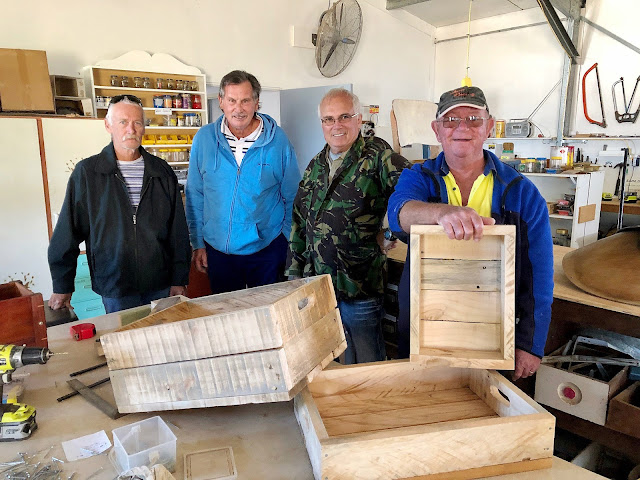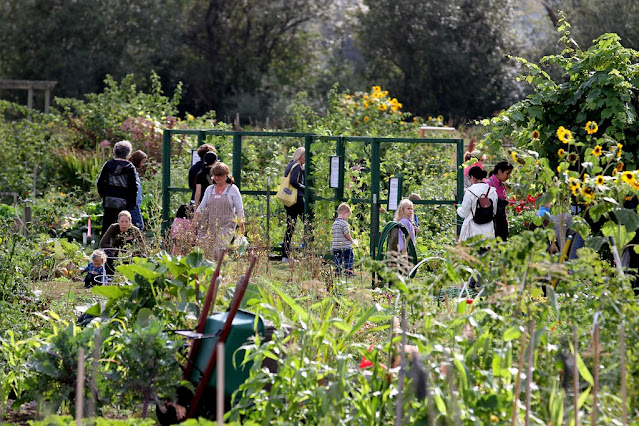 |
| Men's Sheds are springing up everywhere and they aren't just about making things. This one is in Bundaberg, Australia |
This Photo by Unknown Author is licensed under CC BY
The Men’s Shed Movement*
For the more practically inclined, there are Men’s Sheds. Originally started by former miners in Broken Hill in Australia in the 1980’s, they are usually about fixing or making things but have proven to be a good antidote against the loneliness and depression often experienced by older men once their working life is over. Retrenched men, bereaved men, divorced men and Vietnam veterans also find support there. As a spokesperson for the movement explains, “Social isolation is a major killer of men.”
For a longer video about this click here.
Men’s sheds have also proven to be effective in improving men’s physical health because they also become information hubs. Like U3As they have caught on in many parts of the world and can be found throughout Europe, in South East Asia and the USA. New Zealand had 100 in 2017 and the UK had 500 in 2019.
*More recently Men’s Sheds have become more inclusive – less gender specific and more inter -generational, with older people mentoring and passing on skills to younger generations. Admission is however restricted in some Aboriginal communities for cultural reasons.
Repair Cafes
Repair Cafés mentioned in an earlier post are another opportunity for older people to pass on their skills, to help people on low incomes and for people of all ages to come together.
Community Gardens
These are another great way for people to get together, learn a lot, get some exercise and even some food. Click here for those in Australia.- The site also tells you how to start one and has some great ideas about incorporating aquaponics, or starting school or therapy gardens. They also exist in the UK, Canada and the USA.
 |
| This Community Garden at Marymoor in Washington (USA) has 200 private plots as well as growing food for Foodbanks |
This Photo by Unknown Author is licensed under CC BY-NC-ND
Physical Activities
Volunteering
There’s hardly an organisation anywhere that couldn’t do
with some extra hands, whether it’s about Conservation, raising funds for
breast cancer, supporting outreach work –
see for example Age UK, or delivering food for Meals on Wheels (Australia), or
helping out after a disaster. "It's the people you meet, that make it a wonderful experience," say the people doing Meals on Wheels. Volunteering doesn’t even have to be formal. An 80-year-old
uncle of my husband's, would ride around the district each morning, checking to see if the ‘old
people’ needed anything. His motto: “Better to wear out than rust out.” So far he shows no sign of either.
For a list of Volunteer opportunities in the USA click here.
For Australia click here.
The Companionship of Animals
We all know pets can provide a great deal of companionship – there’s always someone waiting for you at home, and dogs particularly, can provide a great opportunity for exercise, for bonding with other dog owners or people on the street. They can also provide some security. Unfortunately, many people who live in rental accommodation are unable to have them, others may no longer be able to afford them or if they are getting older or have to go into hospital or care, may not be able look after their pets any longer.
The USA particularly seems to have a number of organisations to enable seniors to keep their pets by supplying free food and or free veterinary care. Others provide free pets – generally older dogs to seniors, for temporary or permanent care if their owners are no longer able to care for them. The advantage of older dogs is that they are generally calmer and house trained and not nearly as boisterous as puppies.Canada and Australia have similar services too. You can see a list of them here.
A friend in Germany adopts older dogs from Spain so that they won’t be put down. Some people adopt retired greyhounds which are often euthanised very early if they fail to win races. I’m not sure how these programs work but a good place to start would be animal welfare organisations such as the Humane Society or the RSPCA in your area or local vets or animal shelters.
Other Avenues
Shelters often appreciate people taking animals into foster care, or failing that, people coming in to pet or walk animals awaiting adoption. If you are still missing a furry friend, don’t forget the gorgeous cat cafés springing up around the world.
Did you know that Japan even has a retirement home for elderly pets?
Coming Soon - Part 5 Inclusion, Overcoming Age Discrimination
Comments